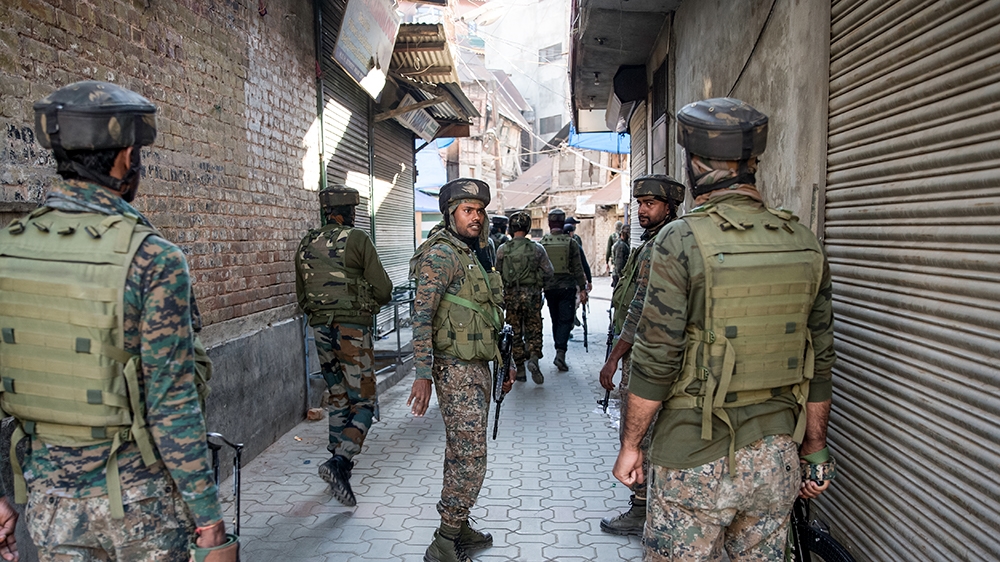India’s top court orders review of Kashmir internet shutdown
The top court said the communications lockdown in Muslim-majority region violated the country’s telecoms rules.

India’s Supreme Court on Friday ordered authorities to review the suspension of internet services in Indian-administered Kashmir within a week.
The government of Prime Minister Narendra Modi imposed a crippling communication and security lockdown in the Muslim-majority region before stripping its autonomy on August 5.
Keep reading
list of 3 itemsIndian woman faces arrest for carrying ‘Free Kashmir’ placard
How 2019 changed the Kashmir dispute forever
The Himalayan region has been without internet since then – the longest such spell imposed in a democracy.
Modi government said the communication curbs were meant to prevent violence by separatists.
The top court said the indefinite suspension violated India’s telecoms rules, and ordered authorities in Kashmir to review internet suspension and other restrictions in a week’s time.
“Suspension of free movement, internet and basic freedoms cannot be an arbitrary exercise of power,” the court said.
‘Freedom of internet access a fundamental right’
Lawyer Vrinda Grover said the court also directed the Indian government to make public all orders imposing a lockdown in Kashmir in August after the constitution’s Article 370 granting Kashmir special status was revoked.
“What the court has said that for essential services, internet must be restored immediately … if they do not remove them, people are free to challenge them and they will be challenged before the respective courts,” Grover told Al Jazeera.
The court held that the internet shutdown impacted the freedom of the press which is part of the freedom of speech and expression.
“Freedom of internet access is a fundamental right,” Justice NV Ramana said delivering the ruling.
It's significant in the sense that the Supreme Court has in principle laid down that access to internet is a fundamental right. It's a basic right and cannot be denied
Modi government’s Kashmir move was accompanied by a harsh crackdown, with New Delhi sending tens of thousands of additional troops to the already heavily militarised region, imposing a sweeping curfew, arresting thousands and cutting virtually all communications.
Authorities have since eased several restrictions, lifting roadblocks and restoring landlines and mobile phone services. However, the internet is yet to be restored in the Kashmir valley.

They have encouraged students to return to school and businesses to reopen, but top political leaders from the region continue to be under arrest or detention.
‘Crippled the freedom of the press’
“Now, will the government lift the restrictions? No one can answer that at the moment,” Al Jazeera’s Anchal Vohra, reporting from New Delhi, said.
“But what the court has essentially said, which is very significant, that any government cannot impose internet shutdowns arbitrarily because the right to internet is part of Article 19 of the Indian constitution.”
Ghulam Nabi Azad, an opposition Congress party leader, and Anuradha Bhasin, the executive editor of the Kashmir Times, were the main petitioners in the court case.
Suspension of free movement, internet and basic freedoms cannot be an arbitrary exercise of power
Bhasin said the restrictions had crippled the freedom of the press, essential services and even communications between families, bringing untold miseries to people.
“It’s significant in the sense that the Supreme Court has in principle laid down that access to internet is a fundamental right. It’s a basic right and cannot be denied,” Bhasin told Al Jazeera.
“The internet shutdown has virtually killed the media in Jammu and Kashmir as there is no information, no content, nobody is writing freely and journalists are operating in an atmosphere of fear because the only place you can work is the media facilitation centre with inadequate facilities.”
Solicitor General Tushar Mehta, who argued the government’s case, said authorities acted based on evidence from intelligence and the military, inflammatory material and speeches, and faked stories, photos and videos that were spread on social media.
Mehta had argued in the court that “modern terrorism relies heavily on the internet” and considers social media as its most effective weapon.
BJP spokesman GVL Narasimha Rao said the government will study the court’s verdict and “act suitably”.
“The MHA [home ministry] has been relaxing all restrictions on its own and resumption of internet too would have happened in due course,” he told Al Jazeera.
Bilal Kuchay contributed to this report from New Delhi